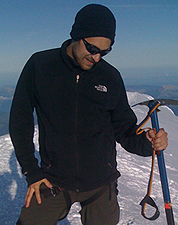Adventurous Ben Lee fellow to give talk today
 |
|
Ben Lee fellow Graham Kribs on Mount Blanc, the highest mountain in Western Europe. |
Graham Kribs lives for adventure. Whether he is conquering mountains, or researching physics beyond the Standard Model, Fermilab’s newest Ben Lee fellow loves a challenge.
Kribs joined the Theoretical Physics Department on the hunt for new physics in October. Today he will present a Wine and Cheese talk about new techniques to identify the Higgs boson using collider data. The talk starts at 4 p.m. in One West.
Kribs is an associate professor at the University of Oregon in the Department of Physics. His research interests include new physics, supersymmetry, extra dimensions and black holes. In his spare time, you can find him mountaineering.
“I like the challenge, and the rewarding vistas from the summit,” Kribs said.
Mountaineering also provides Kribs with inspiration for his work.
“I have been up many peaks with physicist colleagues and collaborators, and a couple times those trips generated ideas that resulted in papers,” Kribs said.
As an undergrad at the University of Toronto, Kribs participated in a Fermilab high energy physics program run by experimental physicist Drasko Jovanovic. After his summer at the laboratory, Kribs was hooked on high energy physics.
Chris Hill, former head of Fermilab's Theory Department, said Kribs was a perfect match for Fermilab.
“Graham’s personal energy made him stand out. He’s the kind of person who can lead others to do great things,” Hill said.
The Ben Lee fellowship is awarded to visiting theorists with outstanding achievements in particle physics. The fellowship honors the memory of the founding head of the Theoretical Physics Department, Ben Lee, who is known for his pioneering work on the Standard Model of elementary particles. In 1973, Lee (with E. S. Abers) wrote a Physics Reports review article which taught the Standard Model to a generation of physicists and was responsible for much of the modern nomenclature, such as the term Higgs boson.
Kribs’ talk, titled “Boosting Higgs Discovery,” promises to be “interesting and relevant,” Hill said.
-- Cynthia Horwitz |